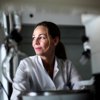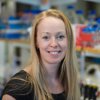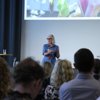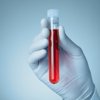Fritextsökning
Artiklar per år
Innehållstyper
-

Her company is developing a new tablet form obesity drug
Obesity and diabetes are the primary targets of a new tablet treatment under development by Malmö-based Pila Pharma. The company’s ambition is to take on the billion-selling GLP1 analogues. ‘‘Basically, I expect all the beneficial effects that they have, but not the same side effect profile,’’ company founder Dorte X Gram said in an interview with Life Science Sweden.
-

Stockholm and Uppsala jointly form a life science cluster
Stockholm and Uppsala are strengthening cooperation in medical research and biotech.
-

GSK pays 2.2 billion dollars to settle Zantac lawsuits
British drugmaker Glaxo Smith Kline, GSK, has struck a 2.2 billion dollar settlement, thereby resolving a vast majority of the liability cases pending against the company in the U.S. that alleged its discontinued drug Zantac caused cancer.
-

This years Nobel prize in medicine – “Changed the understanding of how genes are controlled”
This year’s Nobel Prize in Physiology or Medicine goes to the discovery that small RNA molecules, known as microRNAs, control how genes are regulated. Understanding the mechanism has changed our view of human biology and evolution, says KI Professor András Simon.
-

An increasing number of people are falling ill with TBE – “Much more research is needed”
Tick-borne meningitis, or TBE, is an increasingly common disease in Sweden. Currently, there is a vaccine against the disease but no drugs. Researcher Anna Överby Wernstedt is studying the processes that occur in the brain during a TBE infection and hopes to contribute to developing a treatment.
-

Obesity-drug pioneers win Lasker Award
This year’s Lasker Prize in Clinical Research has been awarded to three researchers for their discoveries in GLP-1-based drugs that, according to the jury, “have revolutionised the treatment of obesity”. Among others, Novo Nordisk’s Lotte Bjerre Knudsen is honoured.
-

Sobi announces agreement with Enable Injections
Swedish biopharma Sobi has entered into an international development and distribution agreement with US drug delivery company Enable Injections.
-

“We should avoid surgery if we can”
Since February this year, she has been Scientific Director Life Science at the Karolinska Institutet. Life Science Sweden met Anna Martling for a talk about role models, surgery and Sweden’s strengths and weaknesses in medical research.
-

What will be the next big hype after obesity? – An expert panel highlighted their top picks
What will be the next big trend in life science? Everything from Alzheimer’s, Crispr and Omics were highlighted when the issue was debated at this year’s major life science event in Lund.
-

Ingrid Lönnstedt: ”The confidence interval and its width”
Always keep an eye on the width of your and others’ confidence intervals, writes Ingrid Lönnstedt in a science column.
-

Takeover bid is being completed – Japanese company acquires Calliditas
Japanese company Asahi Kasei completes the bid for Calliditas Therapeutics after reaching over 90 percent of the shareholding. Callidita's board has now decided to apply for delisting of the company´s share from Nasdaq Stockholm.
-

Artificial intelligence in radiology – “Risk prediction is very exciting”
A growing number of solutions based on artificial intelligence are being developed and used in healthcare. According to Sophia Zackrisson, Professor of Radiology at Lund University, radiology is a field that is well suited to the technology.
-

The investor: “The major common diseases are hot again”
She has previously been voted Investor of the Year and will now be moderating The Future of Swedish & Danish Life Science congress. We check the temperature of the industry with Nina Rawal from Trill Impact Advisory.
-

Thumbs down for lecanemab in the EU – “Very surprised”
The Azheimer's drug lecanemab has received a negative assessment from the European Medicines Agency’s Committee for Medicinal Products for Human Use (CHMP), according to an announcement made by the Agency last week. Bioarctic’s CEO Gunilla Osswald describes the reactions after the announcement as a surprise and disappointment.
-

Healthcare study: Alzheimer’s blood test shows high accuracy
A blood test for identifying Alzheimer’s has now been tested in the general healthcare setting. According to the researchers, the test was 90% accurate in making a diagnosis.
-

Swedish pavilion with healthcare companies at Ukraine fair – “Ukraine is being rebuilt right now”
Private companies and public authorities are both needed in the reconstruction of Ukraine, said Minister for Health Care, Acko Ankarberg Johansson, in her opening speech in the Swedish pavilion at the ReBuild Ukraine fair.
-

Gothenburg, the city of life science – We are ‘Little Boston’
Western Sweden is investing in life science within everything from advanced therapeutic drugs to femtech. At the same time, stakeholders are looking to other industries for inspiration and knowledge.
-

Ranking: Top 10 highest-paid CEOs in pharma
It's nice to hear that things go well for others, right? Some of those who have done really well – at least financially – are listed here in the ranking of the best paid CEOs in Big Pharma 2023.
-

EMA review confirms a risk of new cancer after CAR-T
CAR-T cancer therapies can, in rare cases, induce secondary cancers. The European Medicines Agency (EMA) now recognises this and requires a warning label to be attached to the product information and patients to be followed up for life.
-

Setback for pharmaceutical companies in the Zantac case
A Delaware judge has ruled in favour of allowing expert witnesses to testify in a case involving the now-cancelled drug Zantac and its potential carcinogenicity.
-

Nobel Prize winner Torsten Wiesel turns 100: “Old men like me should use their experience to help the young”
In 1955, a young Torsten Wiesel jumped on a boat to the US and embarked on a fabulous career as a neuroscientist, crowned with a Nobel Prize for his work. Now 100 years old, he looks back on an intense life and his upbringing in Stockholm, Sweden, which shaped his desire to help the vulnerable in society.
-

Innovative start-up helps doctors, scientists and industry balance coagulation risks
For many doctors caring for seriously ill patients, for example, in stroke units and cancer wards, maintaining the life-saving balance between bleeding and thrombosis is an ongoing challenge. In the late 1980s, scientists at Maastricht University in the Netherlands developed an innovative method, the thrombin generation assay (TGA), which provides a complete overview of a physiological process crucial for maintaining normal haemostasis.
-

“Conducting research at universities is becoming more and more like working at a research hotel”
The government wants Swedish research to focus on excellence and innovation, but can the two be combined? Life Science Sweden talks to Anna Falk, a professor at Lund University, about research policy, the constant hunt for funding in academia and what
-

Samuel Lagercrantz: “Companies that do this successfully will take the lead”
The development of new medicines and medical technologies should not focus too narrowly on prolonging life. It is equally important to develop treatments that relieve pain or eliminate painful symptoms, writes Samuel Lagercrantz in an editorial.